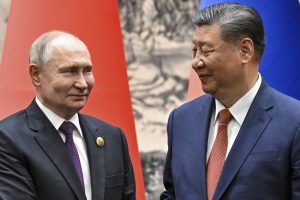Last month, to mark the 75th anniversary of Sino-Russian diplomatic relations, Russian President Vladmir Putin visited China. His Chinese counterpart, President Xi Jinping welcomed Putin with a great display of courtesy and amicability. The two leaders agreed to deepen their “Comprehensive Strategic Partnership of Coordination for the New Era” and issued a statement in which they criticized the West for attempting to replace the widely accepted international law-based order with what they frequently refer to as a “rules-based order.” Regarding the war in Ukraine, [Russia] positively evaluated China’s objective and impartial position on the “Ukraine issue.” [Russia] also agreed to the view that the crisis must be resolved on a basis of compliance with the UN Charter, likewise welcoming that China will be playing a constructive role in resolving the “Ukraine crisis” via diplomatic channels.
Of course, this Sino-Russian perception of the world and their words and actions have not been accepted by the West. There is also a strong tendency to view China and Russia as a monolith, and to perceive and be wary of not only China and Russia but also Iran and North Korea as a group of countries that form some kind of axis. Even in the case of the war in Ukraine, there is considerable discourse that Russia is continuing the war because China is providing military support. In light of this, Putin’s visit to China could be seen as a top-level meeting aimed at strengthening bilateral cooperation. Many in the West are also making the argument that China is starting to position Russia as a junior partner.
In China, reports in official media emphasizing the significance of Putin’s visit and the summit meeting were noticeable. Yet quite a few opinions expressed concern about getting too close to Russia, and Chinese authorities apparently did not act to remove such sentiments from the Internet. For example, some argue that even if Putin were to request China’s full support, China would not be able to fully accommodate the request or to supply weapons. Moreover, there is little discussion about viewing Russia as a junior partner or subordinating Russia. Even official media outlets assume that Russia is not an ally and that the two countries are cooperating in accordance with their respective national interests. Both official media and private-sector discussions agree that there is no total dependency.
Meanwhile, Chinese media outlets have published numerous reports of foreign media noting that Western countries are concerned about the closeness of China and Russia. In particular, there has been widespread reporting within China about U.S. Treasury Secretary Janet Yellen discouraging Sino-Russian cooperation. However, while there are concerns that the growing closeness may indeed worsen China’s relations with the West, some argue that Sino-Russian rapprochement may in fact strengthen China’s relations with the West. The thinking is that if China’s relations with Russia deteriorate, the West will look down on China and treat the country more harshly. So, the argument goes, Beijing should move closer to Moscow, with an eye to relations with the United States and the West.
It is difficult within China to access international news reporting, especially from Western countries. As a consequence, Chinese values and perceptions tend to dominate in the Chinese-speaking world. Recognizing that there is to some extent at least a diversity of thinking in the Chinese-speaking world, the West will need to step up its efforts to penetrate the information space.
KAWASHIMA Shin is a professor at the University of Tokyo.

































